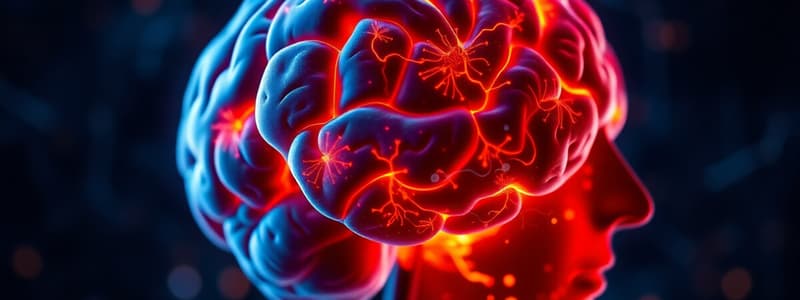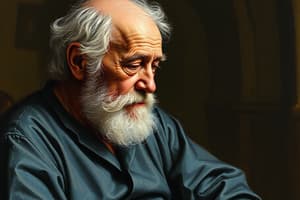Podcast
Questions and Answers
What are the biological theories of ageism?
What are the biological theories of ageism?
Wear and tear, cellular, genetic mutations, and autoimmune.
How does memory change with aging?
How does memory change with aging?
Aging causes selective alteration in memory and affects divide attention, while sustained attention does not deteriorate.
What are the risk factors for cognitive decline in the elderly?
What are the risk factors for cognitive decline in the elderly?
Type 2 diabetes, smoking, depression, and midlife obesity.
Describe children's attitudes toward death based on their age.
Describe children's attitudes toward death based on their age.
How to maintain your brain intact?
How to maintain your brain intact?
Define aging
Define aging
How does Howard Gardner define multiple intelligences?
How does Howard Gardner define multiple intelligences?
What factors determine intelligence and their respective contributions?
What factors determine intelligence and their respective contributions?
Enumerate theories of intelligence
Enumerate theories of intelligence
Define intelligence
Define intelligence
Flashcards
What is aging?
What is aging?
A process of general, irreversible, and progressive physical deterioration that occurs over time.
What is intelligence?
What is intelligence?
The ability to solve problems and adapt to the environment using past learning and current circumstances.
What is the general intelligence (g factor) theory?
What is the general intelligence (g factor) theory?
A theory that states that intelligence is a general ability (g factor) and is an underlying factor for different cognitive abilities.
What is the multiple intelligences theory?
What is the multiple intelligences theory?
Signup and view all the flashcards
What is Sternberg's Triarchic Theory of Intelligence?
What is Sternberg's Triarchic Theory of Intelligence?
Signup and view all the flashcards
What is the wear and tear theory of aging?
What is the wear and tear theory of aging?
Signup and view all the flashcards
What is the cellular theory of aging?
What is the cellular theory of aging?
Signup and view all the flashcards
What is the genetic mutations theory of aging?
What is the genetic mutations theory of aging?
Signup and view all the flashcards
Study Notes
Biological Theories of Ageism
- Wear and tear theory: Suggests aging is due to gradual physiological deterioration.
- Cellular theory: Aging is linked to cellular damage and decline.
- Genetic mutations theory: Age-related changes are influenced by alterations in genes.
- Autoimmune theory: Aging is possibly related to the immune system's declining ability to function properly and attack the body's own tissues.
Memory Changes with Aging
- Selective alteration: Memory changes may not affect all types of memory equally.
- Divided attention: Older adults may have difficulty concentrating on multiple tasks simultaneously.
- Sustained attention: The ability to remain focused over time may not worsen with age.
Risk Factors for Cognitive Decline in the Elderly
- Type 2 diabetes: A risk factor for cognitive decline.
- Smoking: Linked to a higher chance of cognitive impairment.
- Depression: May contribute to cognitive decline.
- Midlife obesity: Associated with increased risk for cognitive decline later in life.
Attitudes toward Death
- Children (under 5): Death is viewed like sleep.
- Children (5-10): Understand death as a permanent outcome.
- Adolescents: View death as universal and irreversible.
- Teenagers: Approach death with acceptance and dignity.
- Older adults: May find acceptance of their own mortality.
Maintaining Brain Health
- Reading: Promotes cognitive function.
- Solving puzzles: Enhances mental exercise and potentially maintains brain health.
- Learning musical instruments: A potentially beneficial activity for brain health.
Definition of Aging
- A gradual, irreversible, and progressive decline in physical function over time.
Definition of Intelligence
- The ability to solve problems using prior knowledge and present conditions.
- The ability to solve problems and adapt to the environment.
Theories of Intelligence
- Charles Spearman: Proposed a general intelligence factor (g factor).
- Louis Thurstone: Developed the theory of primary mental abilities.
- Howard Gardner: Suggested the existence of multiple intelligences.
- Robert Sternberg: Proposes a triarchic theory of intelligence.
Howard Gardner's Multiple Intelligences
- Visual-spatial intelligence: Ability to perceive the world visually and spatially.
- Verbal-linguistic intelligence: Ability to use spoken and written language.
- Bodily-kinesthetic intelligence: Ability to use the body skillfully.
- Logical-mathematical intelligence: Ability to reason logically and solve mathematical problems.
- Interpersonal intelligence: Ability to understand and interact with others.
- Musical intelligence: Ability to perceive and create music.
- Intrapersonal intelligence: Understanding one's own emotions and motivations.
- Naturalistic intelligence: Understanding the natural world.
Factors Determining Intelligence
- Genetics: Accounts for approximately 70%.
- Environment: Accounts for approximately 30%.
Studying That Suits You
Use AI to generate personalized quizzes and flashcards to suit your learning preferences.




